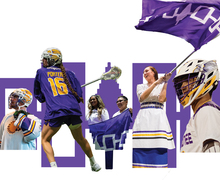Rodgers: Young people should continue confronting civil rights issues addressed by MLK
Dr. Martin Luther King Jr.’s revolutionary “I Have a Dream” speech turned 50 this past week. Celebrations in Washington, D.C., were filled with civil rights leaders, celebrities and political figures such as President Barack Obama, Colin Powell, past presidents Jimmy Carter and Bill Clinton, along with the children and grandchildren of Dr. King.
But also standing at the core of this commemoration were members of our generation. Young people from colleges and towns across the nation – including some from our very own Syracuse University community – face a very unique task in addressing and acting on civil rights issues, injustices and inequalities.
We have to find the balance between acknowledging what has been done, while also facing the new challenges stacked against us.
The society we live in today was created by young civil rights leaders, sparking movements on college campuses such as North Carolina Agricultural and Technical College or the University of Mississippi. It is up to us to utilize that same potential and passion they had, in order to bring forth more equality in areas such as education, fair housing and legal practices.
During her remarks at the “Let Freedom Ring” ceremony on Wednesday, Aug. 28, Oprah Winfrey raised a critical question to the masses before her at the Lincoln Memorial: How will the dream live on?
Well, what exactly is the dream?
We’ve heard these words a countless number of times during elementary, middle and high school, and know that Dr. King envisioned a nation where people of all backgrounds, “will be able to join hands…as brothers and sisters.”
As a nation, we are not at the same point we once stood five decades ago. President Obama spoke of such progression at the week’s past tributes saying, “To suggest, as some sometimes do, that little has changed, that dishonors the courage, the sacrifice of those who paid the price to march in those years.”
But Obama also said Dr. King’s dream has not been fully realized by saying, “We would dishonor those heroes as well to suggest that the work of this nation is somehow complete.”
It is time for us, a generation, to link together these two points President Obama addresses, and realize our pivotal role in seeing Dr. King’s dream through to full fruition.
His vision was not for a color-blind society. The dream is that we be able to see each other as equals, regardless of race, skin color, religion, sexual orientation/preference or gender.
Our world today as millennials is obviously different from that of our parents and grandparents. The demise of de jure segregation and the decline of outward, overt and heinous racial crimes makes it possible for students of all walks of life to study together and live among others at this university.
But even in the year 2013, there is no room for complacency when policies, practices and prejudices still continue to severely affect groups that have historically been discriminated against.
But let’s be honest. Not everyone accepts this challenge, and that is nothing new. Dr. King himself was met with threatening backlashes and fiery criticism left and right – even from those within his own community.
Among oppressors and bystanders alike, what made the civil rights movement such a power storm of change was the leadership from young people. Look at any social movement in this country – or overseas – and you will see that it was students just like us that brought forth the changes they desired.
Nina Rodgers is a sophomore sociology major. Her column appears weekly. She can be reached at nmrodger@syr.edu.
Published on September 3, 2013 at 1:28 am





